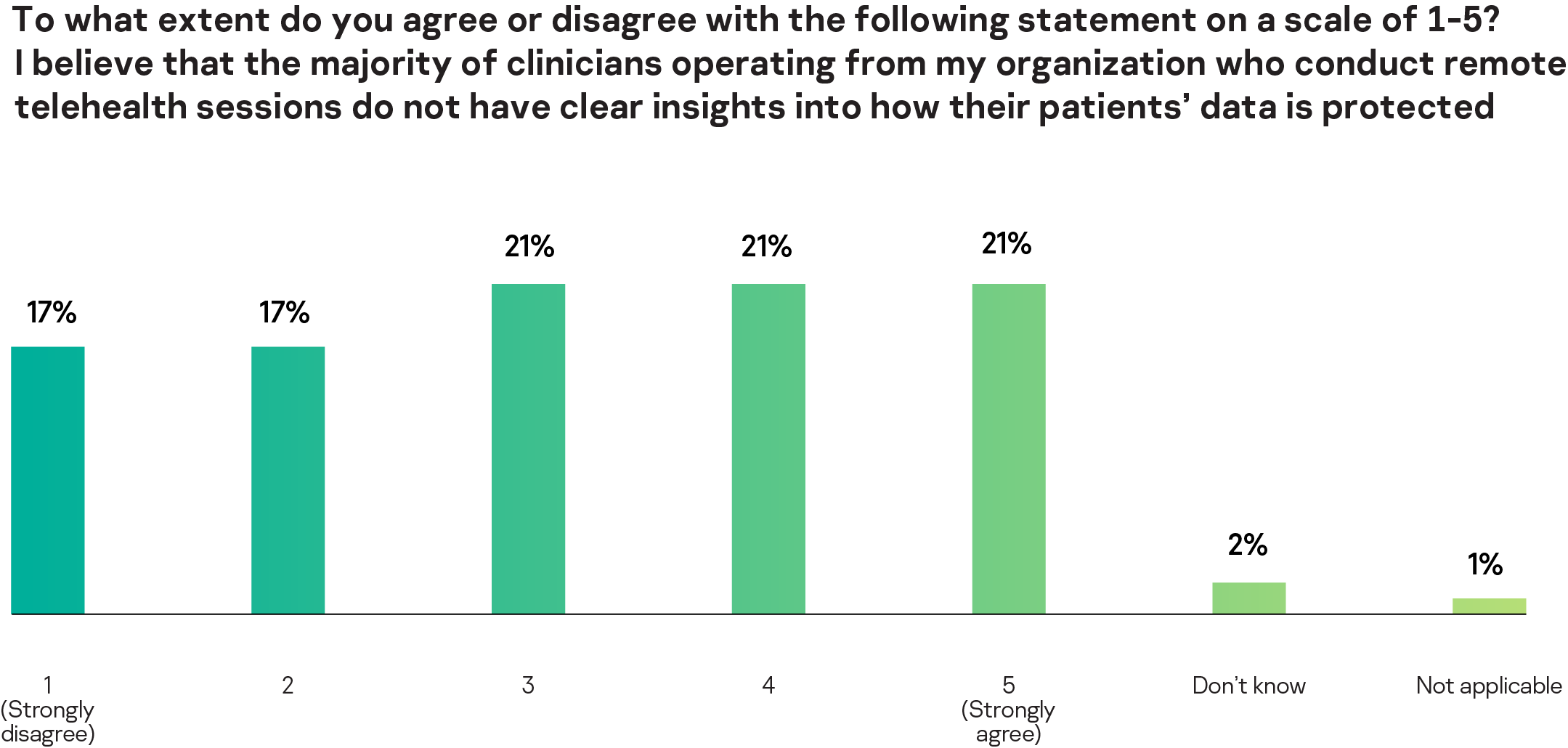Global Kaspersky research unveils that 30% of healthcare providers have experienced cases where their employees compromised customers’ personal information during remote consultations. In addition to this, almost half of providers believe that their clinicians don’t clearly understand how patients’ data is protected. However, 67% of them believe it is important for the healthcare sector to collect even more personal information to further industry development.
Data breaches do not always occur as a result of adversaries’ actions. Quite often, information can be compromised by internal actors. Medical organizations gather, process, and share a plethora of sensitive data and therefore have to pay the utmost attention to the safety of information they receive. Since the recent mass transition to digital health further increased the burden of responsibility on medical providers, Kaspersky surveyed healthcare decision makers around the globe to gain insights into current security-related telehealth issues and find ways to tackle them.
Research shows that only 17% of healthcare providers are sure that most of their clinicians that conduct remote sessions have clear insight into how their patients’ data is protected. This is despite the fact that 70% of medical organizations have dedicated IT security awareness training. These figures can be seen as a sign that the majority of cybersecurity educational practices implemented don’t correspond to reality and fail to cover topics that would be most useful for physicians’ daily practices.

It should also be noted that 54% of respondents admit that some of their clinicians conduct remote sessions using apps not specifically designed for telehealth, such as FaceTime, Facebook Messenger, WhatsApp, Zoom, and others.
Using non-specialized apps in a healthcare setting comes with a risk, as Dr. Peter Zeggel, CEO of arztkonsultation.de, Germany’s leading telehealth provider, points out: "Telehealth applications are specifically designed and certified to safeguard sensitive personal data. Bypassing this high level of protection means risking loss of trust, disciplinary measures and heavy fines. Those who fail to put the right tools in place, could also violate billing requirements for telehealth and miss out on purpose-built telehealth features, such as integrations for patient records or the safe sharing of live data from remote devices.”
Physicians believe that data collection is one of the most important aspects of medical technology development, despite the existing difficulties with data safety. Almost seven in ten (67%) respondents agree that the industry needs to collect more personal information than they currently hold, to train AI and ensure a reliable diagnosis. That means healthcare providers need to strengthen their cybersecurity measures to prepare for a new era of digital medicine.
“To accelerate the evolution of digital health, we have to carefully curate, manage and govern sensitive health data. This information is also valuable to individuals and the healthcare system to improve outcomes and reduce costs. We have already seen encouraging results from using big data for better clinical trial design and reducing both time and costs. We can leverage technologies to ensure privacy while delivering the benefits, for example, using additional privacy measures to facilitate the adoption of AI,” says Prof. Chengyi Lin, Affiliate Professor of Strategy at INSEAD and a leading expert on digital transformation.
“The more complex and critical technology is, the more awareness it requires from people who work with it. This is particularly important for the healthcare industry entering the new digital stage and increasingly facing issues connected to privacy and security. But it's not only about awareness - for any security training to be effective, it should not only deliver up-to-date information but also inspire and motivate people to behave safely in practice,” comments Denis Barinov, Head of Kaspersky Academy.
To minimize the risk of internally caused incidents and provide new perspectives for the industry, healthcare organizations should adjust their cybersecurity policy and make it relevant to today’s needs. This includes clear guidelines on using external services and resources, a thoughtful access policy for corporate assets, and a robust password policy. Of course, all of those measures must be implemented in practice and supplemented by comprehensive security training.
To see more statistics on the current state of digital healthcare and additional cybersecurity tips, follow this link.
About arztkonsultation.de
arztkonsultation.de is one of Germany’s market-leading telehealth applications. Thousands of doctors and psychotherapists use arztkonsultation.de to communicate safely with patients and healthcare professionals. The application was Germany’s first video consultation tool and continues to be a pioneer in telehealth. With its purpose-built features and integrations, arztkonsultation.de enables healthcare professionals to enhance medical workflows with safe and easy-to-use telehealth capabilities.
About INSEAD Business school
As one of the world's leading and largest graduate business schools, INSEAD offers participants a global educational experience. With locations in Europe (France), Asia (Singapore), the Middle East (Abu Dhabi) and North America (San Francisco) and alliances with top institutions, INSEAD's business education and research spans the globe. INSEAD's 165 renowned faculty members from 41 countries inspire more than 1,300 students in degree and PhD programmes. More than 11,000 executives participate in INSEAD's executive education programmes each year.
